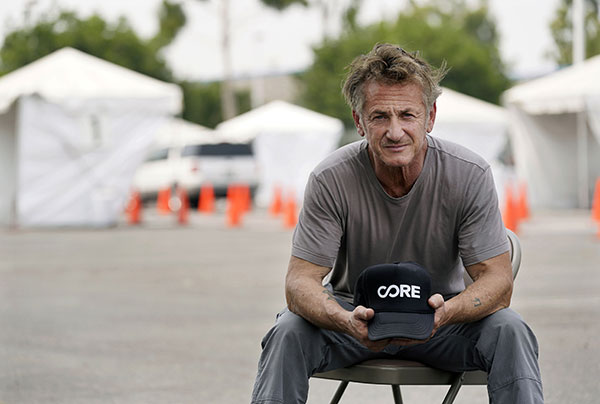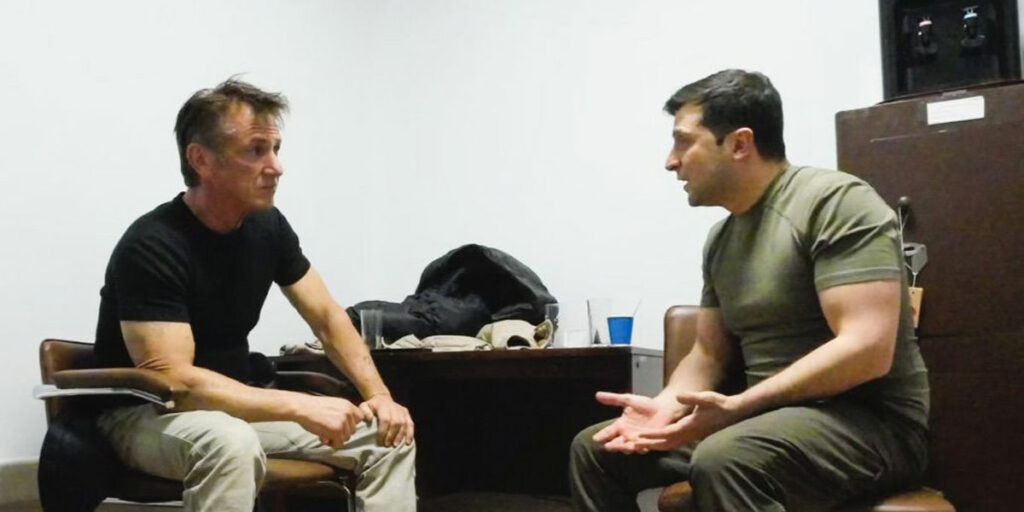In the unfocused but well-meaning Superpower, Sean Penn and Aaron Kaufman find themselves right in the middle of the Russo-Ukrainian War.
What if, when Vladimir Putin invaded Ukraine, you were already in the country filming a documentary? That’s exactly what happened to directors Sean Penn and Aaron Kaufman with Superpower, as the film was supposed to be about the country’s political situation after Crimea’s annexation in 2014, Volodymyr Zelensky’s election, and the threat of impending war. Instead, actual war happened, and when Russia invaded Ukraine on February 24, 2022, Penn (Daddio) and Kaufman had actually been in the country for several months, gathering material for their movie.
The documentary they ended up making is a completely different film than what they had set out to direct, acting both as a crash course on Ukraine for those who are unfamiliar with its history and as a time capsule of a war that’s still ongoing. But Superpower is also a film that’s made up of two very different parts, reflecting perhaps the change of direction the filmmakers had to take when their worst fears came true.
In the first half of the film, we follow Kaufman and Penn as they meet with a series of politicians, journalists, and Ukranian people and approach several topics. We find out about the country’s long fight for democracy and their ache for freedom and independence, and we learn about the consequences of Putin’s propaganda after Russia’s occupation of Crimea and the people’s perception of Zelensky after the 2019 Trump-Ukraine scandal and his past work as an actor.
“You don’t know where the TV president ends and the real president begins,” says one of the interviewees, since Zelensky first played a presidential candidate on television, and then also became President in real life. “He’s a lighter shade of grey,” says a journalist, pointing out that, though Zelensky has flaws and isn’t loved by everyone, he’s also the first Ukranian President who isn’t an oligarch.

This first half of Superpower is engaging and informative, as its main focus is on the people of Ukraine: even if most viewers will be familiar with the history of the country depicted in the movie, genuine warmth can be perceived from Penn and Kaufman’s chats with journalists, politicians, soldiers, and Ukranian citizens.
But Superpower soon becomes a very different movie, when February 24 comes and our co-directors, who were about to leave the country, find themselves in the middle of a war. And so, not only do they decide to stay in Kyiv instead of going home, but they soon end up heading to what would appear to be Russia’s main target: Zelensky’s residence itself.
But when our team of filmmakers meet the President, something unexpected happens: Sean Penn is so deeply touched by Zelensky’s “human need for freedom” that he has an epiphany of sorts, and his opinion of the President drastically changes. Perhaps Zelensky’s show of strength and resilience is a wake-up call for the actor/director, or perhaps he needed a cause to fight for, but we assist to a complete shift of attitude that happens the moment the two of them meet, as all rationality is lost and replaced by pure instinct.
From then on, though the film keeps documenting the war, it also mainly becomes about Sean Penn himself, and that’s where it suddenly becomes less poignant. It’s a shame, since I do believe that Penn was genuinely trying to help – and absolutely did help, in the end – with any means he had at its disposal. What we see on the screen is the direct result of the filmmaker having suddenly found himself in an extremely dangerous situation – made even worse by his own country’s refusal to help Ukraine – and feeling the urge to do something. What comes across is genuine emotion and his efforts are admirable; what hurts the film is that it loses focus of the main issue, making it more about Penn – and Penn’s opinion of Volodymyr Zelensky and Ukraine – instead of continuing to give us insight and and letting us make up our own mind on both.
Superpower is not a bad film. Its first half is informative and engaging, and the second half, though flawed, also acts as a “time capsule” that will become more relevant when the war comes to an end. The issues raised by the film are real and so is the “need for freedom” that Sean Penn talks about: the actor uses the means at his disposal to draw attention to an important cause and, at that, he succeeds. Though the change of tone hurts the film overall, it still remains an informative watch and a call to action for an important cause.
Superpower premiered at the Berlin Film Festival on February 17-18, 2023 and is now available to watch on Paramount+. Read our reviews of Special Operation, The Editorial Office, Checkpoint Zoo, Superpower, and The Last Republican!

